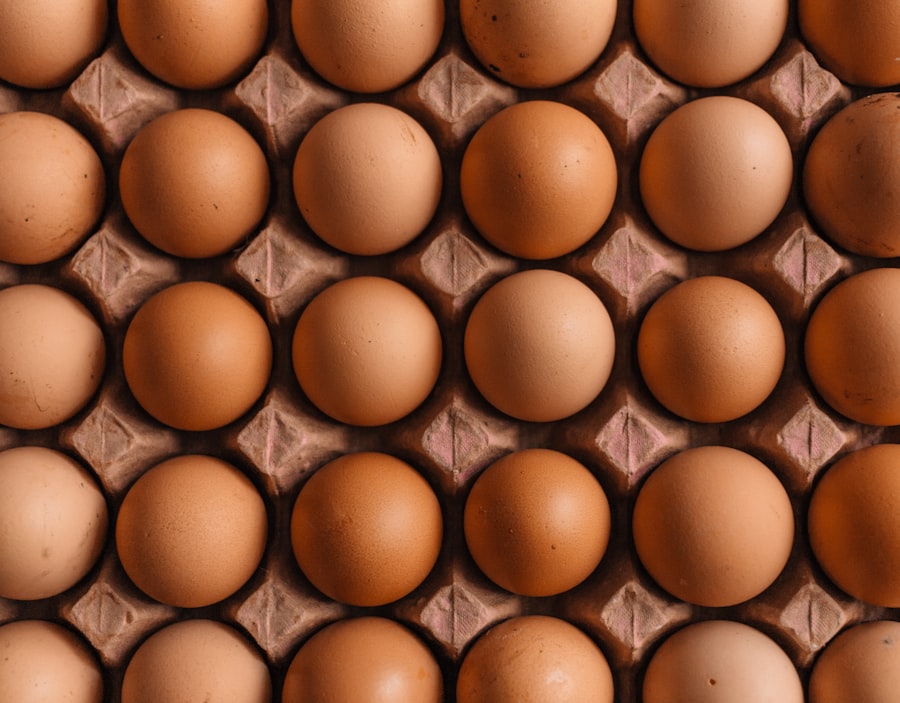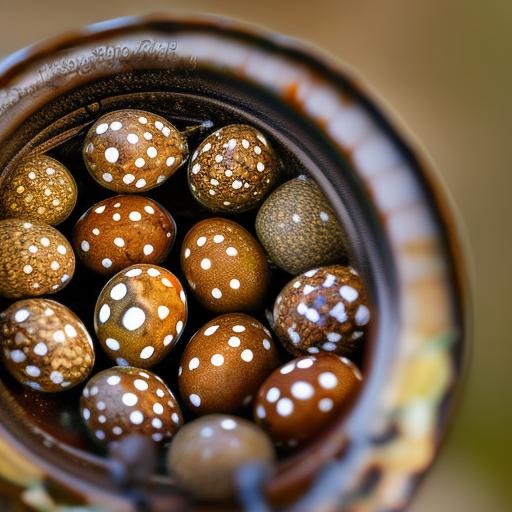Proper storage of eggs is crucial to maintaining their freshness and quality. Eggs should be stored in their original carton in the refrigerator, rather than in the door where the temperature fluctuates more. This helps to protect the eggs from absorbing strong odors and flavors from other foods in the fridge. Additionally, storing eggs in their original carton helps to prevent moisture loss and protects the eggs from breakage. It is important to keep eggs at a consistent temperature, so it is best to avoid storing them on the refrigerator door, where the temperature can fluctuate each time the door is opened.
Another important aspect of proper egg storage is to keep them away from foods with strong odors, such as fish or onions, as eggs can easily absorb these odors. It is also important to store eggs with the pointed end down to help keep the yolk centered and to help maintain the quality of the egg. By following these storage guidelines, you can help ensure that your eggs stay fresh and safe to eat for as long as possible.
Proper storage of eggs is essential for maintaining their quality and safety. Eggs should be stored in their original carton in the refrigerator to protect them from absorbing strong odors and flavors from other foods. Storing eggs in their original carton also helps to prevent moisture loss and protect them from breakage. It is important to keep eggs at a consistent temperature, so it is best to avoid storing them on the refrigerator door, where the temperature can fluctuate each time the door is opened. Additionally, it is important to store eggs with the pointed end down to help keep the yolk centered and maintain the quality of the egg. By following these storage guidelines, you can help ensure that your eggs stay fresh and safe to eat for as long as possible.
Key Takeaways
- Proper storage of eggs is essential to maintain their freshness and quality.
- Cleaning and handling eggs with care can help prevent contamination and spoilage.
- Temperature control is crucial for preserving the freshness of eggs.
- Regular egg rotation ensures that older eggs are used first, maintaining freshness.
- Proper packaging of eggs can help protect them from damage and contamination.
- Checking for freshness through simple methods like the float test can help determine the quality of eggs.
- Utilizing preservation methods such as refrigeration or freezing can extend the shelf life of eggs.
Cleaning and Handling
Proper cleaning and handling of eggs is essential for maintaining their quality and safety. It is important to wash your hands before and after handling eggs to prevent the spread of bacteria. When cleaning eggs, it is best to use warm water that is warmer than the egg itself, as this helps to prevent bacteria from being drawn into the egg through its porous shell. It is important to avoid using cold water for washing eggs, as this can cause the contents of the egg to contract, potentially drawing bacteria through the shell.
When handling eggs, it is important to be gentle and avoid dropping or jostling them, as this can cause cracks in the shell, which can lead to contamination. It is also important to avoid washing eggs with soap or detergent, as this can remove the protective coating on the shell, making it easier for bacteria to enter the egg. By following these guidelines for cleaning and handling eggs, you can help ensure that they remain safe and of high quality.
Proper cleaning and handling of eggs is crucial for maintaining their quality and safety. It is important to wash your hands before and after handling eggs to prevent the spread of bacteria. When cleaning eggs, it is best to use warm water that is warmer than the egg itself, as this helps to prevent bacteria from being drawn into the egg through its porous shell. It is important to avoid using cold water for washing eggs, as this can cause the contents of the egg to contract, potentially drawing bacteria through the shell. When handling eggs, it is important to be gentle and avoid dropping or jostling them, as this can cause cracks in the shell, which can lead to contamination. It is also important to avoid washing eggs with soap or detergent, as this can remove the protective coating on the shell, making it easier for bacteria to enter the egg. By following these guidelines for cleaning and handling eggs, you can help ensure that they remain safe and of high quality.
Temperature Control
Maintaining proper temperature control is essential for preserving the freshness and quality of eggs. Eggs should be stored at a consistent temperature of 40°F (4°C) or below in order to slow down the growth of bacteria and maintain their quality. It is important to avoid temperature fluctuations, so it is best to store eggs in the main body of the refrigerator rather than in the door where the temperature can fluctuate each time it is opened.
It is also important to transport eggs home from the store in a cooler or insulated bag during hot weather to prevent them from reaching unsafe temperatures. Additionally, it is important to avoid leaving eggs out at room temperature for more than two hours, as this can increase the risk of bacterial contamination. By maintaining proper temperature control, you can help ensure that your eggs remain safe and of high quality.
Maintaining proper temperature control is crucial for preserving the freshness and quality of eggs. Eggs should be stored at a consistent temperature of 40°F (4°C) or below in order to slow down the growth of bacteria and maintain their quality. It is important to avoid temperature fluctuations, so it is best to store eggs in the main body of the refrigerator rather than in the door where the temperature can fluctuate each time it is opened. It is also important to transport eggs home from the store in a cooler or insulated bag during hot weather to prevent them from reaching unsafe temperatures. Additionally, it is important to avoid leaving eggs out at room temperature for more than two hours, as this can increase the risk of bacterial contamination. By maintaining proper temperature control, you can help ensure that your eggs remain safe and of high quality.
Egg Rotation
Rotating your eggs regularly can help ensure that they maintain their freshness and quality. Eggs should be rotated regularly so that older eggs are used first, as fresher eggs are more desirable for cooking and baking. By rotating your eggs regularly, you can help ensure that none of them go bad before they are used.
It is important to check the expiration date on the egg carton when rotating your eggs, as this can help you determine which ones should be used first. Additionally, it is important to store new eggs at the back of the refrigerator so that they are used after older ones. By following these guidelines for egg rotation, you can help ensure that your eggs remain fresh and safe to eat.
Regularly rotating your eggs can help ensure that they maintain their freshness and quality. Eggs should be rotated regularly so that older eggs are used first, as fresher eggs are more desirable for cooking and baking. By rotating your eggs regularly, you can help ensure that none of them go bad before they are used. It is important to check the expiration date on the egg carton when rotating your eggs, as this can help you determine which ones should be used first. Additionally, it is important to store new eggs at the back of the refrigerator so that they are used after older ones. By following these guidelines for egg rotation, you can help ensure that your eggs remain fresh and safe to eat.
Packaging
Proper packaging of eggs is essential for maintaining their freshness and quality. Eggs should be stored in their original carton in order to protect them from absorbing strong odors and flavors from other foods in the refrigerator. The original carton also helps prevent moisture loss and protects the eggs from breakage.
It is important not to wash or clean eggs before storing them, as this can remove the protective coating on the shell, making it easier for bacteria to enter the egg. Additionally, it is best not to store eggs with foods with strong odors, such as fish or onions, as they can easily absorb these odors. By following these guidelines for packaging eggs, you can help ensure that they remain fresh and safe to eat.
Proper packaging of eggs is crucial for maintaining their freshness and quality. Eggs should be stored in their original carton in order to protect them from absorbing strong odors and flavors from other foods in the refrigerator. The original carton also helps prevent moisture loss and protects the eggs from breakage. It is important not to wash or clean eggs before storing them, as this can remove the protective coating on the shell, making it easier for bacteria to enter the egg. Additionally, it is best not to store eggs with foods with strong odors, such as fish or onions, as they can easily absorb these odors. By following these guidelines for packaging eggs, you can help ensure that they remain fresh and safe to eat.
Checking for Freshness

Checking for freshness is an important step in ensuring that your eggs are safe and of high quality. One way to check for freshness is by performing a simple water test. To do this, fill a bowl with water and gently place an egg in it. If the egg sinks and lays flat on its side, it is very fresh. If it sinks but stands upright or tilts slightly, it is still fresh but should be used soon. If it floats, it has gone bad and should be discarded.
Another way to check for freshness is by examining the egg itself. A fresh egg will have a thick white and a round yolk that stands up tall in a compact shape. If an egg has a thin white or a flat yolk that breaks easily when cracked open, it may not be fresh. By regularly checking for freshness using these methods, you can help ensure that your eggs are safe and of high quality.
Checking for freshness is an important step in ensuring that your eggs are safe and of high quality. One way to check for freshness is by performing a simple water test. To do this, fill a bowl with water and gently place an egg in it. If the egg sinks and lays flat on its side, it is very fresh. If it sinks but stands upright or tilts slightly, it is still fresh but should be used soon. If it floats, it has gone bad and should be discarded.
Another way to check for freshness is by examining the egg itself. A fresh egg will have a thick white and a round yolk that stands up tall in a compact shape. If an egg has a thin white or a flat yolk that breaks easily when cracked open, it may not be fresh. By regularly checking for freshness using these methods, you can help ensure that your eggs are safe and of high quality.
Utilizing Preservation Methods
There are several preservation methods that can be used to extend the shelf life of eggs. One common method is pickling or preserving eggs in a solution of vinegar, salt, and spices. This method not only preserves the eggs but also infuses them with flavor.
Another preservation method is coating eggs with mineral oil or storing them in a container filled with mineral oil. This helps seal the pores in the eggshell and prevents air from entering or exiting the egg, which helps extend its shelf life.
Additionally, freezing eggs can also help preserve them for future use. To freeze whole eggs, simply crack them into a freezer-safe container and mix them together before freezing. For individual use, you can also freeze separated yolks or whites by placing them in ice cube trays or small containers.
By utilizing these preservation methods, you can extend the shelf life of your eggs and reduce waste while still enjoying their nutritional benefits.
There are several preservation methods that can be used to extend the shelf life of eggs. One common method is pickling or preserving eggs in a solution of vinegar, salt, and spices. This method not only preserves the eggs but also infuses them with flavor.
Another preservation method is coating eggs with mineral oil or storing them in a container filled with mineral oil. This helps seal the pores in the eggshell and prevents air from entering or exiting the egg, which helps extend its shelf life.
Additionally, freezing eggs can also help preserve them for future use. To freeze whole eggs, simply crack them into a freezer-safe container and mix them together before freezing. For individual use, you can also freeze separated yolks or whites by placing them in ice cube trays or small containers.
By utilizing these preservation methods, you can extend the shelf life of your eggs and reduce waste while still enjoying their nutritional benefits.
Some common preservation methods for eggs include refrigeration, coating the eggs with mineral oil to seal the pores of the shell and prevent bacteria from entering, and pickling the eggs in a vinegar solution. Additionally, you can freeze eggs by cracking them into a container, lightly beating them, and then freezing them in ice cube trays for future use. These methods can help you keep your eggs fresh for longer periods of time, allowing you to make the most of your egg supply and minimize food waste.
If you’re interested in learning more about different types of poultry eggs, you might want to check out Poultry Wizard’s article on how many eggs geese lay. Understanding the egg-laying habits of various birds can provide valuable insights into how to keep their eggs fresh and maintain their quality.
FAQs
How long do quail eggs stay fresh?
Quail eggs can stay fresh for up to 2 weeks when stored properly.
What is the best way to store quail eggs?
The best way to store quail eggs is to keep them in the refrigerator at a temperature of around 45-50°F (7-10°C) in their original carton or in an egg holder with the pointed end down.
Can quail eggs be frozen to keep them fresh?
Yes, quail eggs can be frozen to keep them fresh for a longer period of time. However, it is recommended to crack the eggs and remove the shells before freezing.
How can I tell if quail eggs have gone bad?
You can tell if quail eggs have gone bad by performing a float test. Simply place the eggs in a bowl of water – if they sink and lay flat on the bottom, they are fresh. If they stand upright or float, they are no longer fresh and should be discarded.
Can quail eggs be washed before storing them?
It is not recommended to wash quail eggs before storing them, as this can remove the protective coating on the eggs and make them more susceptible to bacteria. If the eggs are dirty, it is best to gently wipe them with a dry cloth.
Meet Walter, the feathered-friend fanatic of Florida! Nestled in the sunshine state, Walter struts through life with his feathered companions, clucking his way to happiness. With a coop that’s fancier than a five-star hotel, he’s the Don Juan of the chicken world. When he’s not teaching his hens to do the cha-cha, you’ll find him in a heated debate with his prized rooster, Sir Clucks-a-Lot. Walter’s poultry passion is no yolk; he’s the sunny-side-up guy you never knew you needed in your flock of friends!







